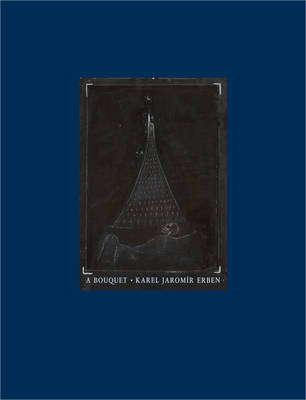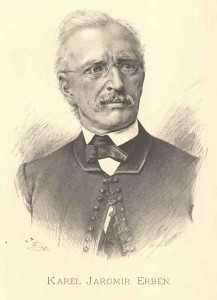Poetry Review: Flowers for the Motherland — “A Bouquet of Czech Folktales”
In 1853, the Czech scholar Karol Jaromír Erben published A Bouquet of Folk Tales, which became a source-book for artists and composers and “one of the three foundational texts of Czech literature.”
A Bouquet of Czech Folktales by Karel Jaromír Erben. Translated from the Czech and introduced by Marcela Malek Sulak. Artwork by Alén Diviš. Twisted Spoon Press, $21 (hardcover).
By Jim Kates
Some of the more benign fruits of the nineteenth-century cultivation of nationalism were the pithy nuts of ethnic folklore gathered and preserved in various ways by academic and literary folk. We’re mostly familiar with the harvest and cookery of the Brothers Grimm, but this kind of thing was going on all over Europe. In 1853, the Czech scholar Karol Jaromír Erben published a confection of his own gathering, Kytice z pověstí národních (A Bouquet of Folk Tales) that became a source-book for artists and composers and “one of the three foundational texts of Czech literature.” It’s a familiar story in the abstract and an intriguing one in the particulars. These particulars are now available in an English translation by Marcela Sulak, with illustrations from the work of Alén Diviš, a mostly expatriate, Czech artist of the twentieth century.
There are 12 “motherful” flowers in this posy, following the introductory legend of the origin of thyme:
Maybe some mother’s daughter will find you;
your breath will be her sweet perfume.
Maybe you’ll come across somebody’s son;
his heart will incline to you!
All of these are rhymed verse in the original, and Sulak has tried to be faithful in form as in content. She has also deliberately adopted a kind of “close enough for folk music” irregularity, which, as in native English, is sometimes highly eloquent and sometimes verges on doggerel. To determine how much this reflects the original (whether Serben’s artifice or his actual sources) and how much it represents her own license, it will take someone far more conversant than I am in Czech idiom. She has given a good account of her process in her informative introduction: “Each line should take the same amount of time to say, unless the line depicts a difficult activity. . . . These poems were intended to be read aloud, and that is how I have translated them.”
Just for an example, though, here is the opening of the disturbing ballad “The Noon Witch” in the original, in a more or less literal translation, and in Sulak’s English:
U lavice dítě stálo,
z plna hrdla křičelo.
“Bodejž jsi jen trochu málo,
ty cikáně, mlčelo!”
[At a bench a child stood,
screamed with a full throat.
“God, if you would only a little,
you gypsy, be quiet!”]
A child stands crying at his bench,
shrieking as loud as he could.
“If only you’d be quiet! Hush,
you gypsy! and be good!”
I can’t say I’m impressed by the energy in Sulak’s versification here. She has padded for her sense of the rhythm and rhyme (“stands crying“ and “be good”) and lowered by a slight register the level of exasperation. But she has kept the sense and the movement of the story and used the verse to propel the story forward, wherein the mother threatens her bawling kid with the witch of the title and the father comes home at noon to find, in Sulak’s English,
Mama’s fallen by the door;
the child rises and falls on her breath.
As Papa lifts her from the floor
he sees the child — squeezed to death.
where “breath” is there for the English rhyme, the last line lilts a little much for my taste. My clumsy understanding of the Czech original reads more like “The mother lies there in a faint / the child is held to her breast / the mother can hardly get up / but the child is suffocated.”
However you read it, it’s a grim ending, and other flowers in this bouquet are no less dark. Without me having to underline it, you will already have noticed that mothers abound. There is a mother who learns a salutary lesson about true wealth in “The Treasure,” a murderous mother in “The Golden Spinning Wheel” and another one in “Lily,” a cautionary mother in “Water Sprite” (and her daughter is a mother, too), a metaphorical mother in “Willow,” an overly indulgent mother in “A Daughter’s Curse,” and finally the mother as Motherland in “The Prophetess.” Many of the poems echo ballads and folk tales we know from other parts of Europe. For instance, the singing “Golden Spinning Wheel” echoes distantly the “Twa Sisters” of English and Scandinavian song, and “Wedding Shirts” evokes the traditional demon lover. For illumination on this and other issues, the “Author’s Notes” at the end are not to be missed. They explain much without unnecessary erudition, locating the stories in their Indo-European, Slavic context.
The book ends on a different note: an explicitly nationalistic, explicitly Czech “Prophetess” proclaims the restoration of a “hot heart” and a genuine head” to a land that has been disfigured by “egoism and fatuous superciliousness” (as the notes have it). All in all, A Bouquet‘s distinctive Central European flavor enriches our general store of European tales.
Tagged: A Bouquet of Czech Folktales, Czech folktales, Karel Jaromír Erben, Marcela Malek Sulak, translation



A useful review, whose observations I tend to share. I would recommend you read and compare the newly published translation of Erben’s Kytice by Susan Reynolds, which I find excellent.